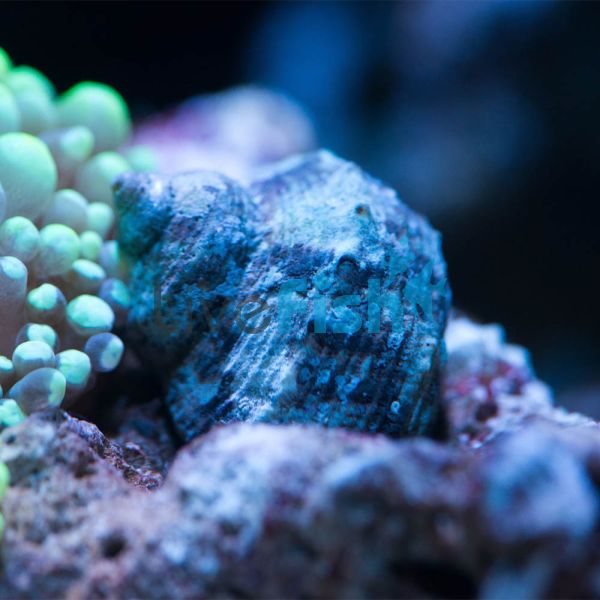Turbo Snail - Medium
This stunning species of sea snail has been dated back to almost 100 million years ago during the Upper Cretaceous period which makes a great talking point for your home aquarium. These little critters will continually graze on algae growing on the live rock and glass in your tank.
- Buy 5 for $17.24 each and save 10%
Turbo Snail
This beautiful creature has a shell that can range from 3 to 10 cm which is a rich brown with dark bands running around it. Scattered with white splotches and other thin stripes.
It is extremely difficult to breed this particular species of snail in captivity as opposed to other similar Turbo Snails which can quickly turn into hundreds. There is no known way to distinguish between males and females. Their genus name comes from the word "turban" which is what their shells seem to resemble.
They are a great option for beginner saltwater aquarium owners. Turbo snails are more active during the night but can still be seen sometimes venturing out during the day to look for food and graze. Depending on their size it can seem like they can hide in almost any nook or cranny.
These snails are found in the Indo-Pacific region ranging from the Red Sea and Madagascar over to Southern Queensland and Western Australia at varying depths. They are seen both alone and in larger grazing groups along the reef bottoms.
Tank Recommendations for Turbo Snails
The smallest tank size for turbo snails is 120 liters per snail. Add another 100 liters per snail as a common mistake is adding too many of them to the same tank thus causing them to starve. Snails need calcium for their shells so make sure your water has sufficient levels. Be sure to provide plenty of live rock for them to roam around on although sometimes you may see them crawling along the inside of the glass. Make sure you have a tight-fitting aquarium lid just in case they decide to climb over the top. No special lighting or water movement is required.
Suitable Tank Buddies
Turbo snails are extremely peaceful animals but care must still be taken when choosing what other species to house them with. Take into account any other species of algae grazers such as Tangs when picking the number of snails to keep. They can and will knock over small pieces of coral that aren't tired down.
Usually Compatible
Clownfish, Cardinalfish, and Blennies will get along great with these guys. Other wonderful choices include Damselfish, Dragonets, and Gobies. Other invertebrates as well as Scorpionfish should be perfectly fine as well. Tangs are a good option too. Turbo snails will leave your live corals alone but they may knock them over by accident.
Sometime Compatible
Take caution when combining them with both dwarf and large species of Angelfish. Frogfish, Batfish, and Boxfish should be watched carefully as well. Other species that should be kept together only under close supervision include Butterflyfish, Groupers, and Grunts. Goatfish, Hawkfish, and Rays may prey upon them sometimes also. You may have similar problems when housing with Squirrelfish and Snappers.
Rarely Compatible
Avoid keeping turbo snails with Eels and Filefish as they will most likely get eaten. Hogfish, Parrotfish, and Pufferfish should also be avoided completely too. Other species which you shouldn't consider are Triggerfish and Wrasses. You should steer clear of all species of Sharks as well.
Feeding Your Turbo Snail
This species are herbivores and will survive on a diet mostly consisting of naturally occurring algae that grow on live rock and other tank surfaces. If needed you can supplement their diet with dried seaweed but this should only be used if enough algae is not present.
| Scientific Name | Turbo petholatus |
|---|---|
| Care Level | Easy |
| Common Names | The Turbo snail is also known as the Tapestry Turban. |
| Diet | Herbivore |
| Fish Family | Turbinidae |
| Lifespan (years) | 1 |
| Max. Length (cm) | 10 |
| Min. Tank Volume (l) | 120 |
| Origin | Indo-Pacific |
| Reef Safe | Yes |
| Sociability | Peaceful |
| Venomous | No |
| Water Conditions | 22-27° C (72-80° F), dKH 8-12, pH 8.0-8.4, sg 1.020-1.024 |




